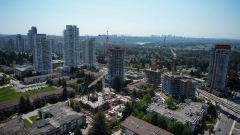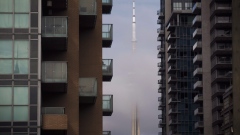You are now being redirected to the BCE.ca website (Bell Canada Enterprises), where you can view our Accessibility plan, and submit your feedback using our Accessibility webform.
13h ago
Sudan’s Civil Conflict Spreads South as Peace Talks Falter
, Bloomberg News
(Bloomberg) -- Fierce fighting between Sudan’s army and a rival paramilitary group persists in the capital, Khartoum, as efforts to end their 10-week power struggle founder, while a rebel group known as the SPLM-N has opened up a new front in the conflict.
A large SPLM-N force has mobilized in the South Kordofan region and is hampering efforts by the Sudanese Armed Forces, led by Abdel Fattah al-Burhan, to gain the upper hand in its battle with the paramilitary Rapid Support Forces, according to witnesses and internal United Nations documents.
Some of the worst clashes in recent days have focused on the southern town of Kadugli close to the South Sudanese border and surrounding settlements where the rebels attacked army positions. The military responded by firing heavy artillery.
“We always knew this war would escalate and escalate fast. Now, it has reached South Kordofan, soon it may well be Abyei and other conflict-prone areas,” said Kholood Khair, founding director at Confluence Advisory, a think tank focused on Sudan. “This war has reignited existing conflicts that had to some degree become dormant.”
Read More: What’s Behind the Fighting in Sudan and What It Means: QuickTake
The army accused the SPLM-N of attacking its troops in Kadugli, while the RSF said the army had conducted air strikes, including one that struck a mosque and killed innocent civilians. Bloomberg couldn’t immediately verify either claim.
The SPLM-N’s sole objective is to achieve self-determination in areas under its control, and its attempt to capitalize on the army’s vulnerability may end up inadvertently aiding the RSF, according to Khair.
Stop-start peace talks that had re-convened in Jeddah, Saudi Arabia, again faltered this week, US Assistant Secretary of State for African Affairs Molly Phee told a House Foreign Affairs Subcommittee hearing on Thursday.
Representatives from the warring military factions hastily left a June 21 meeting when it became clear negotiations weren’t feasible, two people briefed on the proceedings said.
Read More: A Red Sea City Becomes Haven for Those Fleeing Sudan’s Civil War
The UN’s World Food Programme said more than 500,000 people have fled Sudan since the conflict began, while at least 2 million have been internally displaced. Administrative barriers, theft and looting by both sides in the conflict have made it almost impossible to deliver supplies to hospitals and thousands of injured people, according to aid groups.
“Armed groups have looted MSF facilities and beaten and violently threatened staff,” Médecins Sans Frontières said in a statement this week. “MSF’s Sudanese staff in particular have faced traumatic threats during looting, all while trying to provide medical care to their fellow Sudanese.”
The UN children’s fund estimates that more than 300 children have died in the fighting so far. Gender-based violence has also become more prevalent in recent weeks — the Sudanese Unit to Combat Violence Against Women and Children, a government body has documented at least 36 sexual assault cases in Khartoum alone.
“We have received reports of an increase in kidnappings and mass sexual violence in Khartoum, which unfortunately targets young girls between 12 and 17 years old,” it said in a statement earlier this month.
In Darfur, there have been ongoing reports of ethnic-based attacks as thousands of civilians flee the conflict. Homes abandoned by non-Arab Masalit communities have now been occupied by Arab communities, a sign of ethnic cleansing, the UN said this week.
©2023 Bloomberg L.P.









